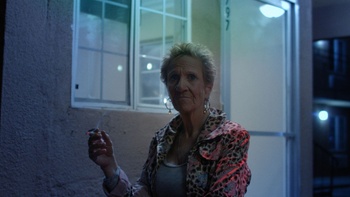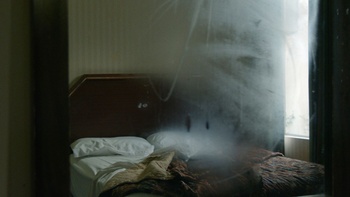Winner of the Grand Prix at the Ji.hlava International Documentary Film Festival, Vacancy has just been named the best Belgian film at the Millenium Festival. That should be enough to convince you to join Brussels film-maker Alexandra Kandy Longuet on a journey to meet the people who have holed up in California’s dilapidated motels while waiting for their lives to get back on track.
Also read: Vincen Beeckman: Romance sans abri

"We reserve the right to refuse anyone.” The tone is set by the notices in the many motels along the roadsides of Anaheim. A town in a southern suburb of Los Angeles, home to Disneyland and other factories of the American dream, it is also a stopover for those who have been left behind by that dream, lured by the employment opportunities and the availability of casual work (a similar setting to that of Sean Baker’s recent The Florida Project ). “The myth that you can remake yourself in the West is still strong,” explains Alexandra Kandy Longuet, who continues to explore the documentary form and the US of social outcasts in her new film Vacancy . “I have a love/hate relationship with the United States. That inner conflict is a driving force in my work,” explains the film-maker, whose films are snubbed on the other side of the Atlantic. “Americans hate films by Europeans about America.”
After the award-winning Nouvelle-Orléans, laboratoire de l’Amérique (2016), which followed the hopes and disappointments of the reconstruction process in the state that was devastated by Hurricane Katrina, and As She Left (2012), a poetic take on the same disaster, the French film-maker, who has lived in Brussels for the last ten years, went to meet some of the inhabitants of California’s seedy and crumbling motels. People like Beverly, Manuel, and Vern. What they have in common is that they have met an impasse on life’s road. Cooped-up in a motel, they are waiting until they can find the way out.
Americans are born storytellers. They don’t have a problem with talking about themselves, showing emotion, or crying.
In Vacancy , the majestic desert and mountain scenery surrounding the motels, which looks like it’s straight out of Bagdad Café or Paris, Texas , contrasts with the gruelling reality of their occupants. That harmonious dissonance is accentuated by Caroline Guimbal’s sublime photography, which perfectly captures the blueish evening hues, the processions of coloured neon lights, the soft light piercing the curtains of the claustrophobic and solitary rooms, the cigarette haze from people whose dreams have gone up in smoke. “I wanted to play with people’s fixed ideas about motels,” says Alexandra Kandy Longuet. “I don’t think you can make films in America while pretending not to have been saturated with references to US cinema. In Europe, the motel doesn’t have such a negative connotation, whereas in the US it’s a place that is neither comforting nor welcoming. The motel has evolved over the course of US history and has been shaped by its economic trends.”
You play, you pay
Torn between painful nostalgia, the unbearable suspense of the present, and the promises of the future, the protagonists in Alexandra Kandy Longuet’s film seem to be swept up in a whirlwind that has removed them from reality and prevents them from moving forward. The motel is an endlessly extended stopover in their rough patch. “There is something hypnotic about their lives. The days go by with no change, every day the same struggle for survival.” At nightfall, the inner turmoil culminates. “Night-time doesn’t bring sleep but rather nightmares. The demons awake, along with the remorse and regret. In Vern’s case, there are literally ghosts.”

The subjects in Vacancy rival the great characters of US fiction. Their lines were not written, but they are touchingly real. The words they confide to the camera alternate between resigned wisdom, dark poetry, and bitter fable. “You pay, you play. You play, you pay,” says Manuel, once known by the name Big Daddy. Once father to a family, he is now paying the price for his mistakes in a squalid motel room. “Memories are things that can help you or harm you,” says Beverly, whose prematurely lined face and thick speech betray suffering that has long since been drowned with substances. Beverly’s descent into hell began with the death of her husband. Since then, she has been wandering, far from her son, whom she chose to spare her suffering, in the hope of one day being stable again. “One day I will do something extraordinary.”
“Americans are born storytellers. They don’t have a problem with talking about themselves, showing emotion, or crying. That’s very important in a documentary,” says Alexandra Kandy Longuet, whose characters are breathtakingly moving thanks to the persistence and quality of her research. “I wanted to have powerful and reciprocal encounters. In the motels I visited, I encountered exploitative relationships with junkies and people who were suffering. I wanted to be part of a genuine exchange, between equals. That’s also one of the reasons that I take part physically in filming by acting as the sound operator. So that the person being filmed understands that the film-maker is not building a relationship with them, which the camera will document, but that they are making a film.”
“Not everybody was willing to take the risk. Beverly had been threatened by the owner of the motel, for a start. People thought we were cops or journalists and they had no interest in talking to either. The people who agreed to open up were those who have already gained some sort of perspective on life,” says Alexandra Kandy Longuet. “I think they found that there was something liberating about the film, a way of making peace with a part of themselves.”
VACANCY
BE, dir.: Alexandra Kandy Longuet, release: 3/4
Read more about: Film
Fijn dat je wil reageren. Wie reageert, gaat akkoord met onze huisregels. Hoe reageren via Disqus? Een woordje uitleg.